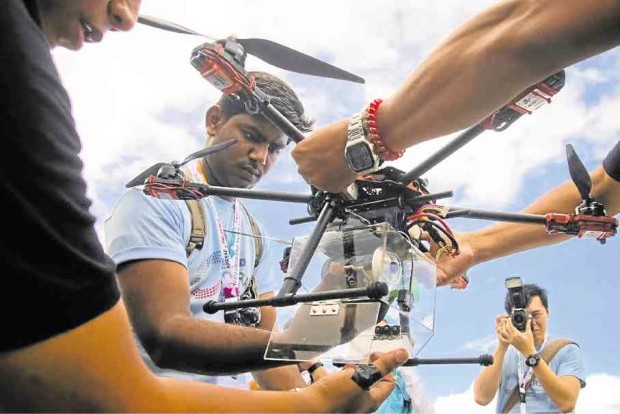
Participants load a can satellite into a drone during the first international Can Satellite Competition held at the University of
the Philippines Los Baños, Laguna. —KIMMY BARAOIDAN
LOS BAÑOS, Laguna — A team from Rizal National Science High School in Rizal province topped the first international Can Satellite Competition, a side event of the 23rd Asia-Pacific Regional Space Agency Forum (APRSAF) held recently at the University of the Philippines Los Banos in Laguna province.
The team, composed of Grade 11 students Josh Rael Jorquia, Matthew Lemuel Rey and Maria Ena Rosales, bested eight teams from five countries.
“Their primary mission is to simulate the mission of a satellite or space probe coming down the planetary atmosphere. They are also allowed to have a secondary mission, which they can design on their own,” said Dr. Rogel Mari Sese, vice chair of the side event working group for APRSAF.
Sese, an astrophysicist and coordinator of the Philippine Space Science Education Program of the Science Education Institute (SEI) under the Department of Science and Technology, said each team was tasked to fit a small satellite into a soda can.
Jorquia said his team’s can satellite gathered data such as temperature, pressure, GPS location, time, humidity, heat index, intensity of light and dew point.
For two months, the team analyzed its data by comparing these to existing data found on the internet, said their teacher and coach, Marlon Sta. Catalina.
The can satellite competition aims to expose participants to the process of actual satellite development, said Dr. Josette Biyo, SEI director, during the event’s opening last week.
“By gaining fundamental knowledge in these processes, we hope to mold you to become future experts in the field of space science, technology and innovation. You need not become astronauts or go into space to make an impact in those fields,” Biyo said.
Sese said they were hoping that the Philippines’ hosting of the forum would spark interest in space science and technology among the youth, local scientists, engineers, politicians and decision-makers.
“The Philippines needs to have its own space capability because it ensures our access to space and, at the same time, it’s something that we can use for our national security and development,” he said.